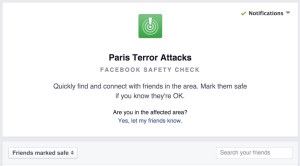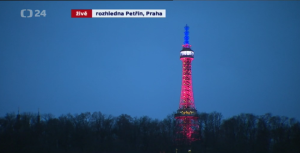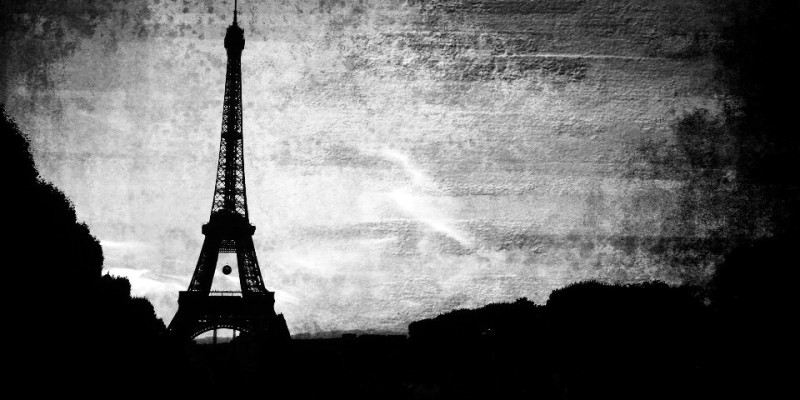One week after the terrorists’ assaults in Paris, one may have witnessed a whole scale of different responds to this terrible tragedy: From the manifestation of solidarity and fraternity to the expression of hatred and collective responsibility judgements. The later is alerting, especially when you can see it among the dispute resolution professionals. Do mediators have a right to express similar opinions?
Facebook Terror Notification
 I was awakened by a beep of my blackberry on Saturday morning. The Facebook application notification informed me that 42 friends of mine had been “marked as safe” during the Paris Terror Attack.
I was awakened by a beep of my blackberry on Saturday morning. The Facebook application notification informed me that 42 friends of mine had been “marked as safe” during the Paris Terror Attack.
Let’s put aside the latest trend of information being provided by social networks faster than by regular media. Let’s skip also the criticism focused later on Facebook for selectively using this tool. All those issues, however interesting, are fading away in the light of the terrifying facts:
On the evening of 13 November 2015, the terrorists killed 130 people and injured 368 people during the series of coordinated attacks in Paris. I was absolutely shocked – not only because of the tragedy of the situation but because I, somehow, consider Paris as my second home after having lived there for more than two years.
From expression of solidarity…
 After the horrible event, we were able to witnessed an unseen wave of solidarity and fraternity with Paris. The #JesuisParis and Pray for Paris slogans were almost everywhere. People has paid the respect to the victims all around the world. For instance, here in Prague, the famous Lennon’s wall just in front of French embassy was covered by flowers and candles. Further the Petřín Lookout Tower nicknamed the Prague Small Eiffel Tower was lit up in the French tricolor.
After the horrible event, we were able to witnessed an unseen wave of solidarity and fraternity with Paris. The #JesuisParis and Pray for Paris slogans were almost everywhere. People has paid the respect to the victims all around the world. For instance, here in Prague, the famous Lennon’s wall just in front of French embassy was covered by flowers and candles. Further the Petřín Lookout Tower nicknamed the Prague Small Eiffel Tower was lit up in the French tricolor.
In London, almost all attenders of the French-English friendly football match sang La Marseillaise in unison.
I was personally touched by a video of Antoine Leiris reading a message to the terrorists. His wife and mother of his 17 months old son – Hélène Muyal, was one of 89 people killed in the Bataclan theatre. Yet, Antoine stated that the terrorist will have neither his nor his son’s hatred. The letter was originally posted on Facebook and then shared thousands of times on social media and finally videotaped by the BBC.
…to wave of xenophobia
Unfortunately, the attacks caused also much more negative emotions. So we were able to see wave of collective responsibility judgments and stereotypes aimed against all muslims and refugees. Not surprisingly, those were proclaimed neither by those, who were injured, nor by those who lost their relatives and friends. These sentences were mentioned by private persons on social networks, by some officials as well as by suspicious xenophobic groups.
By this post, I am not trying to express my political opinion on refugee-crises in Europe. I am merely pointing out the language and behavioral patterns adopted by part of current society. This is even more shocking because such a language is adopted even by educated and well situated people such as lawyers, judges and dispute resolution professionals.
Yes, indeed, I have heard the most surprising words coming from the persons that is engage in mediation.
One example for all: I met with my mediation friend in order to drink a glass of French wine. We were discussing the situation in Paris when she suddenly said: “In fact, I am really afraid of Muslims and I am happy to live in the part of the Czech Republic, that is not so open to strangers as Prague is… I am afraid they will come and that they will push through their habits in all Europe and that we will not be free anymore…The European values will perish…”
I stayed bouche bée – not because of the words itself – there were much more serious proclamations made in recent days – but because I would have expected the mediator to speak and think differently.
The real mediators’ task
That afternoon, my only thought was whether mediators are not banned from this kind of thinking. Does not fighting the stereotypes belong among major mediators’ task? I have a lot of friends who are Muslims. Muslim is not a synonym for a terrorists as well as Christian is not a synonym for a member of the Ku Klux Klan.
This has brought me to thinking, whether mediation is just an ordinary profession or there is also a kind of public responsibility of putting people more together. After all, there were mediators risking and sometimes even losing their lives in order to bring the peace and agreement to the places dominated by conflict and hatred.
Are not the mediators in charge of unbuilding cognitive biases and of putting people more together rather than of pushing them away? Or can we start to think and behave differently once having left the mediation room?
________________________
To make sure you do not miss out on regular updates from the Kluwer Mediation Blog, please subscribe here.




One can differentiate between a mediation on thoughts like a holy man of any kind of religion which could settle one’s soul and a mediation on facts like a holy mediator which could settle a dispute. Being in the first position as well at the second one the role of any mediator is the same. There is no space to escape earlier than the problem will have been solved. Otherwise the mediation does not meet its purpose. Even if it would have cost the life of the mediator.